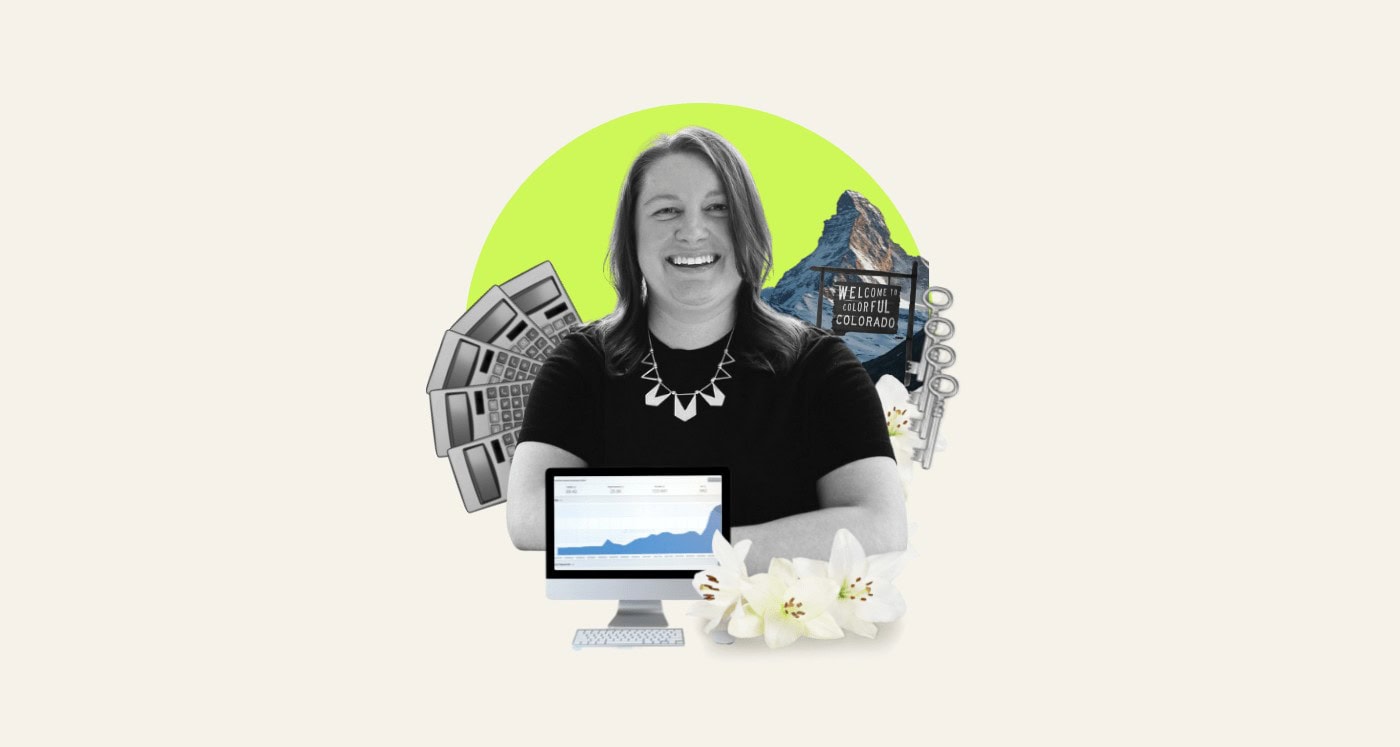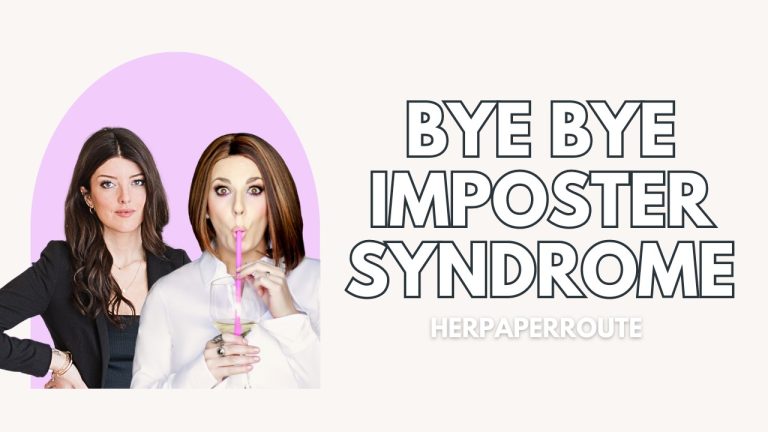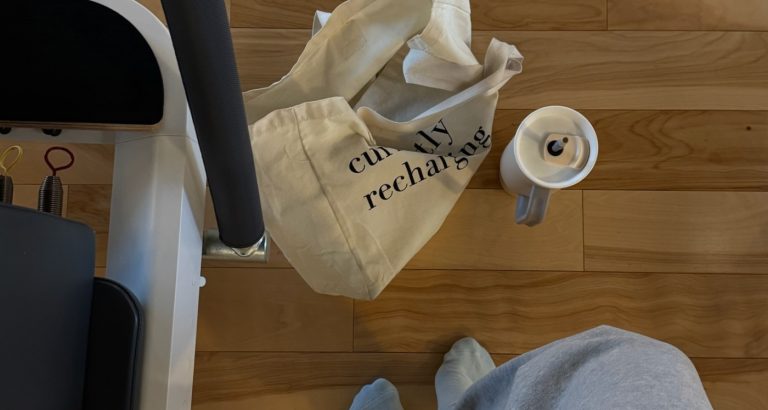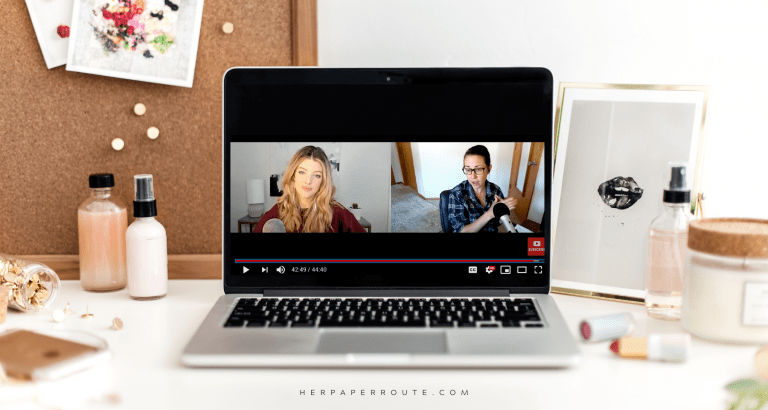How I Get 70,000 Page Views Without Pinterest

Can your young niche site really get 70,000 page views without Pinterest? Our guest today says YES. We are chatting with a content creator who outranks government websites with her young local travel blog by following a specific SEO growth strategy. One that does not use Pinterest or email marketing, at all.
Listen to the podcast on Apple Podcasts | Google Podcasts | Spotify
As an affiliate partner of various brands and sponsored content, HerPaperRoute may earn commission on qualifying purchases. Disclaimer
The HerPaperRoute podcast is hosted by niche site investor Chelsea Clarke. We are here to help you buy, scale and sell profitable niche sites.
Today’s guest, Business Manager & Blogging Consultant Carrie Smith Nicholson has bought, developed, and sold niche sites for many years. She recently purchased an established blog, with my help as her broker.
Carrie is on the podcast today to share her strategy for how she grew her 2-year old travel blog to 70,000 page views without Pinterest or email marketing. The site now outranks popular tour websites and Government sites.
Resources Mentioned
- Niche site startup class – enroll free
- My favorite blogging tools – check out the vault here
- Buy a niche site – view listings
- Sell your niche site – Apply and get a free valuation
- Carrie’s travel blog HashtagColoradoLife.com
Q. Hi Carrie, how did you get your start as a niche site developer?
I’ve been in the online space and in the online entrepreneur world for 10 years, as of 2021.
I was blogging back in the day when people were coding their own websites! They didn’t have WordPress or anything like that.
Right, as blogging was becoming more popular, but it wasn’t super mainstream yet. And I had a full-time job as an accountant. As well as a part-time job in taxes, I prepped people’s taxes, small business taxes, specifically.
During the tax season, I got a lot of the same questions. A lot of business owners asked me the same things.
So I wanted to start a blog to help address those questions and just lead them to those resources to help them out. And it really morphed from there.
I started doing a lot of freelance writing in the personal finance space. I went to conferences around finances, accounting, taxes, and all that, and a lot of people in this space became, or they came to me and realized that I knew a lot about small business accounting.
When you have an online business, sometimes it seems like the IRS doesn’t know how to deal with you.
Some of the deductions were different back then. They were still figuring that out.
So I was able to help navigate that with my blog. That was the first blog that I owned. And then after I sold that one in 2018, I wanted to start a new blog in a totally different niche.
I wanted to focus on travel, which I personally loved as a hobby, although gave never really been into travel blogging before.
But I wanted to specifically target local blogging as a Colorado travel blog. So that’s what it turned into.
I also have, as you know, dabbled a little bit with purchasing other niche websites and writing on those. So I’ve been freelance writing and blogging for the past decade.
Related: The Ultimate Guide To Monetizing A Travel Niche Blog
Q. When you switched from finance to travel, was it difficult to monetize a totally new niche?
Yes, it was hard! It was quite the learning curve, I will say.
My finance blog earned 90% of it’s revenue from affiliate marketing.
But when I tried applying affiliate strategy to my travel blog, especially a local one, it completely tanked! I spent about nine months going through my old strategies until I finally learned that that strategy was not going to be the best revenue stream for this business.
Also, I didn’t want to create a course for the travel site, because I didn’t feel like it was a good fit for the niche with it just being a statewide site.
Nowadays 90-95% of the travel niche site’s revenue now comes from ads on the site.
We’re with MediaVine, and we earn through ads. I also have a book, a travel guide that we sell on Amazon.
My travel site started taking off in the past six months or so. I sold my finance blog and started this second one in April of 2019.
So it’s still pretty young, two years.
I’ve really thought about, how I can expand and grow the revenue and brand sponsorships with local businesses/
We promote some local Jeep tours, we work with people on touristy stuff when they have activities and packages for tourists.
Of course, 2020 set us back a lot. I had goals for this last year that I didn’t get to accomplish.
But this year, it’s definitely opening up a lot more. And that’s been really fun too because we get paid to go travel and do these cool things.
Then we will make a video about it or a podcast or a guide on the blog.
Related: The best video marketing tool to grow your business
Q. What has been the biggest benefits of blogging for your business?
Truthfully, my being able to work from home has been the biggest benefit of blogging. Going through the pandemic, and everything didn’t really change my schedule.
I’ve been working from home full-time for the past eight years. And that has been so freeing to not have your world turned upside down like a lot of people did.
Although we did have other aspects of the pandemic affect us, it didn’t affect the work part of it.
And when I say us, I mean my husband and me. We do the business together, which is also another perk of blogging!
Being able to go into business with your spouse. He’s a Colorado native, he was born and raised here. I moved here after living in Texas for 30 years. So I’m the newcomer.
That’s how we present our Colorado travel blog, our point of view is to help newcomers and natives alike.
So it’s been a really fun thing to be able to control my own schedule, work together on a project with my spouse.
Also, I just love the flexibility of learning different niches!
That’s something that I felt like I really wanted to learn and add to my portfolio was not just knowing the personal finance niche or the business niche, but something totally different and creative.
I’ve learned all of them really well and have been able to understand SEO and YouTube and everything that goes along with it.
So that’s been really fun.
Q. What is your strategy that generates over 70,000 page views without Pinterest or email marketing?
So yes, it’s been quite the experience. As I said, I had to learn a lot of things, or maybe even unlearn a lot of things from the previous niche to this one.
But mostly, I just focused completely on SEO.
The first six to nine months of the business, I did work on Pinterest, and Instagram. I was really trying to grow the social following.
In the same vein of every week, we released a podcast episode. And then I would do a blog post every week.
So really, focusing on creating that content hub for the foundation of the business.
That took a while because I had other projects going on, other client work, etc.
I don’t have anyone else on the team, I do it all. I handle everything. But in 2021, I created a goal to write two blog posts a week. So I would write 100 blog posts this year.
That’s a challenge for myself, all written by myself, to create that hub of content, basically all SEO.
Then another thing that my husband Ryan has been working on is YouTube SEO. He’s been creating a lot of YouTube videos.
Together, we are just doubling down on SEO. The reason for this is because I do have a lot of experience with email marketing, and I knew how much that was involved in Pinterest marketing.
I spent six or eight months on it and was not able to really find that traction as I did with SEO.
So I decided to work with my strengths, and really focus on what I enjoy and am good at.
becoming singular-focused, hyper-focused on what I was good at, and how I knew the business could grow so that we could start earning revenue. I put a lot of money into starting this new business.
I wanted to make sure I got that revenue out before I started expanding to other things that maybe would be more time-consuming or not as successful.
Q. What do you do specifically when you are working on your website to set it up for SEO success?
Well, the first thing that I did was start writing more generalized guides.
Top 10 places to visit or things to do, for example. I generalize it from there and then I filled in the content.
So that each one of those points would have a guide that would connect to it.
If I was talking about a mountain town or a place to visit or a city, I would do a city guide or a guide on that mountain town that would dive into even deeper things that you could do.
So it would show that there was a content wheel that people could click to, and then learn more and keep clicking on the website and stay on the website longer.
Also, as the pandemic rolled around, we were only allowed to travel within 20 to 30 miles of our State.
So all of those guides and everything we publish, all the photos we took, all the videos, and everything could only be done within the 20-30 mile radius.
So we had to become niche-specific on a particular city where we live. And not just the whole state in general.
That also really helped our SEO last summer when even though it was down, those guides really started ranking a lot better.
So I’d say, thinking about the content hub as a whole has been a major part of my SEO strategy.
Think about how you can fill out those resources so that people don’t have to click to other websites to find out more info.
Every day I use Google Analytics, Google Search Console, and Ahrefs. I use them to identify what people search for, what phrases they use.
For example, there was a search phrase that everybody kept looking for when they’d hit our website. It was “warm places to live in Colorado.” We didn’t have a guide on it. And we haven’t had one for over six months.
I keep seeing this term that people were using. So I wrote a guide about it, and within a week it started ranking!
It is just crazy in SEO, to start ranking so fast. It usually takes about three months (with a young site).
Q. On-page SEO must really play an important part in ranking your blog posts so quickly. Would you agree?
Yes, on-page SEO is definitely where I spend a lot of my time. I follow other people who are really versed with SEO, especially Debbie Gardner, who you’ve had on the show before.
And a lot of other people that I’ve listened to from your podcast, too.
They all say that if you’re a smaller blog, you really need those backlinks to rank well.
Well, I wanted to see if that was true. So I spent a lot of time making my content really good and most importantly, interlinking. All things that bettered my on-page SEO.
And I found that yes, the backlinks work, but having my own links to myself worked really well also.
Now every time I publish a new post, I use a plugin called Search Regex.
It’s a really lightweight plugin, you just type in a phrase, for example, “warm places to live in Colorado.” It will then show you where on your site you’ve mentioned that before, and link to your new posts from old content.
It makes it super fast and easy, I do that pretty much I would say three, four times a week. Every time I publish a new post, or I want to update an old one, I just use that plugin to interlink between old and new content.
Because also, you never want anything just sort of hanging out, standing by its own. You want to have all the content on your website relate to each other.
This has been a real game-changer. Google loves updated content.
So that’s another part of my strategy: once or twice a month, I take one of my really big travel guides and make sure all the info is up to date.
Especially with events, making sure the dates are correct and that all the numbers are accurate, the pricing when they open when they close.
Every single month, I’m updating content, which I think is nice for a seasonal business like this.
In the spring, I’m already updating all the summer content. In summer, I’ll go through and update all the Fall stuff.
This way, when fall hits, the content is available, current, and active.
Also, people start looking for summer activities early in the year. Places to swim things to go explore, hike, and etc. So having it already updated with the current year’s date is worthwhile.
I feel like Google really likes that because it does reward our website and we’ll rank over denver.org or big tourist websites now. We even outrank government websites and tour websites.
It really makes a difference.
Q. Are there any SEO myths that you would want to dispel?
I really don’t like to hear when people don’t go for high competition keywords because they think it will be too hard to rank for it.
If you look up “things to do in Denver”, that is a huge keyword. It has a ton of competition.
Yet, I wrote a guide about it a year ago and I’ve updated it, I’ve added to it. I keep making it as in-depth as possible.
I keep growing the site. I do a lot backlinking, from external sources, internal, etc.
And that article is now on the first page of Google. That’s how long it took.
Yes, it’s a huge keyword. And there’s a ton of competition, but it doesn’t mean you won’t ever get there.
Just be strategic and understand that, well, it may take you a while to get there. You may not want to bank on that right away.
But don’t overlook those big keywords because you could rank down the road.
Q. You set a goal for yourself to publish 100 blog posts this year. How is that going?
It’s going really, really well. I publish on Tuesdays and Fridays. I’ve not missed a day yet.
Every couple of Tuesdays I will do an update, a big overhaul, add some content, delete some content.
So it’s not just changing dates and then republishing, it’s actually overhauling the article.
It’s going really well. I’m totally on target. I started with 61 blog posts, and I’m up to 84 right now.
So definitely on target for the goal this year, and I think it will happen no problem, I’m in a really good rhythm right
now.
I have found that it’s so interesting with multiple sites that I’ve owned. I’ve owned several in the past, and then I own two currently right now.
The magic number to get traction on a niche site, at least that I have found from personal experience, is when you get around 150 blog posts on your site.
If they are well organized, 150 to 200 blog posts is when you really start ranking well, more than 100,000 pageviews a month.
So that’s why I also made that challenge for myself because I was at about 60 articles. I wanted to double that and get up to 150 within a year.
That’s why I made this goal for myself because I know that that’s been the magic number, at least for me the way that I do my strategy.
My Favorite Niche Site Tools
Running a profitable blog takes a few great tools. I know it can be hard when you’re trying to develop and monetize when you don’t know which tools actually can help you get ahead and which ones are just pricey, shiny object distractions. To make it really easy for you, I have compiled a list of all of the tools, software, apps, templates, and training that I use to run and scale my blog and business. From the best email service providers to legal page templates to beautifully styled stock photography, reliable web hosting, and even cart systems for selling digital products. It’s all there! Find all of the tools of the trade that I swear by right here!
Q. When someone is looking to buy a blog, what are some things that you would recommend that they do to do their due diligence?
A lot of entrepreneurs and myself included really focus on the revenue.
How much revenue is it making? Is it on an upward or downward trend?
But that’s not always the number that can be useful, right. It can be email marketing, it can be how many Pinterest users you have, your traffic from Pinterest.
And then also how that mixes really well, or not so well with your own personal strategies and your strengths.
So that’s why I focus on buying blogs that have strong SEO, or the potential for strong SEO.
Because that’s a strength that I have. I know I can turn that around really quickly, without a lot of effort, and get good results.
I’ve learned a lot about Mediavine ads. So that would be something that I would look for in the future.
Another thing to think about is the social media following and what the community is like. Whether there is a podcast or a YouTube channel included. Or the potential that you can create one.
Basically what I’m saying is to look at the statistics, yes, and understand the revenue, but also know how you can mix that with what you’re good at and really make it into a really awesome resource, to build up a great opportunity in the future.
Get free access to our handy due diligence tool here.
Q. Do you have a favorite niche that you like to look for when you’re looking to buy?
I don’t actually! I have become more open to different niches over the years.
But the finance niche, I know like the back of my hand. So that I would classify it as low-hanging fruit.
In 2020, how we think about the world changed. How we seek medical advice, how we gain an understanding of what’s going on, where we get our news.
All of those things could be different niches that you could explore if you deliver it in a way that people would want to consume it.
In addition to the 100 blog posts, my husband and I are doing a 52-week hiking challenge.
So that also dovetails into the travel blog, because I can use it as content.
It’s also just really fun to go out and explore 52 new hikes. So these are like individual hiking trails that we’ve never been to or haven’t explored yet.
Then we document it on YouTube and share it with our audience. As I said, I’m really good at finding things to get paid to do what I would do anyway.
That’s a fun thing I’m working towards this year. It’s a personal exercise goal, to be healthy as well, but then also help out the business and get more content.
Chelsea: That’s awesome. I’m the same way. Anytime I’m doing something in my personal life, I still think how can this work for my business? How could this be content? How could this be repurposed? If you can build your blog on something that you were personally interested in, like your hobbies, that can be a great way to build out the content for your blog. But also, then all of those things that you do as a hobby, become a tax write-off for your business. So you can earn AND save money by creating content around the things that you love to do.
Q. Thank you! Where can everyone find and follow you, Carrie?
My travel blog is HashtagColoradoLife.com and on Instagram @HashtagColoradoLife.
It’s really an honor to share my journey and being able to bust a few myths that you can only grow with Pinterest or you have to have an email marketing list. Which you can always have later.
I believe SEO is the best way to grow a business when you’re just starting out.
How I Get 70,000 Page Views Without Pinterest – Conclusion
Thanks for reading/listening to today’s episode. Are you thinking about starting your own niche site? You have options!
If you want to start your niche site from scratch, I have a free online course that walks you through every step of setting up your website, as well as traffic tips and monetization tips. Just go to her paper route.com slash start and you can access that training for free and now y
You can start your website for pretty much nothing. All you really need to pay for is hosting when you’re just getting started.
But it will cost you your time to build a site from scratch. It takes time to build up traffic and a community and revenue.
However, there is a faster way. You don’t have to start from zero! You can actually purchase a website that is already established.
One that already has traffic, content, social media followers, email subscribers, and is already earning revenue.
Or if you have a niche site and you would like to sell it, I will give you a free website valuation and a suggested listing price, if you would like to sell your site in our marketplace.
We have so many buyers and investors who are hungry for awesome content sites.
So if you are sitting on one and you would like to cash out, and allow me to help connect you with a buyer, apply to sell it here.
The last thing that I want to say is just thank you so much for all of the reviews you have been leaving on the HerPaperRoute Podcast, and for all the shares you’ve been giving us on social media.
I appreciate it so much. I run this podcast from a closet in my room, and I do all of the editing myself. I do all the promotion myself.
So knowing that you are letting your friends know about the show and you’re sharing it on your social media means so much. Thank you so much to everyone who has done that or is about to do it today.
Pin This

Follow along on Instagram!










